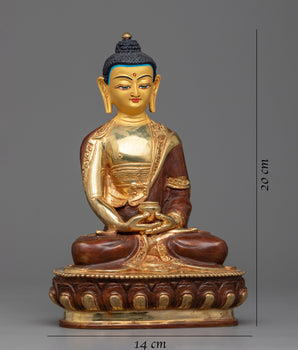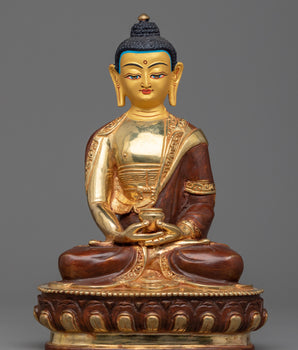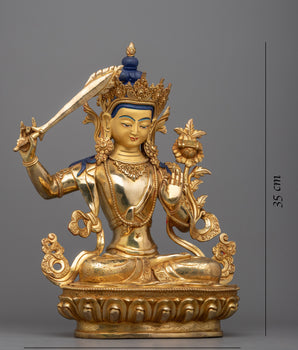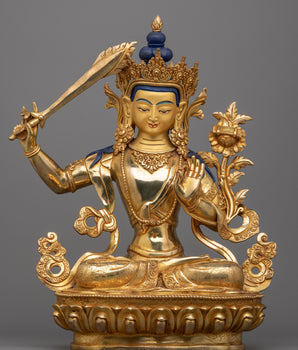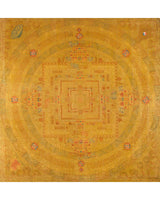
Gold Kalachakra Mandala Thangka | Tibetan Buddhism Spiritual Painting

100% AUTHENTIC

HANDMADE

FREE SHIPPING
Gold Kalachakra Mandala Thangka
To put it plainly, Gold Thangkas are not painted from an aesthetic perspective but rather completed only to earn merit on the part of the patron. It is because of the large amount of gold used in making the thangkas. It provides a similar context to that of Tibetans offering gold to paint the Jowo’s face in Lhasa and also painting the faces of statues in gold.
An interesting Eastern Tibetan parable speculates the origin of the Gold Thangka. It concerns a highly spiritual Lama who once invited two famous artists one from Chamdo, the other from Central Tibet, to paint his shrine room from him. The Lama showed them his shrine room where they discovered the walls were covered with gold paint. The Lama explained that some time previously, he had actually experienced a vision of radiant gold figures.
He recounted his vision to the artists and asked if they could recreate these figures upon his wall He stated the forms were to be created without the use of sketch work or the application of a single brush stroke upon the gold. The two conceived the idea to utilize the technique of burnishing the gold, executing the outlining and shading with this method. The work was so finely accomplished that t is said the figures were animated in appearance. The artists then being renowned as divine artists The Tibetan term for the work is 'Serku jazer ma', translating into Serku (Gold image) jazer ma (rainbow with radiant), gold images with the radiance of rainbows.
It is reported that in the year after Buddha Shakyamuni attained Enlightenment,he was asked by King Chandrabhadra of Shambhala to teach the Kalachakra Tantra.The Buddha manifested himself in the form of the Kalachakra meditational deity and gave the full teachings and initiation of this tantra.The kalachakra teaching was then transmitted through a lineage of seven kings and 25 propagators.
About Kalachakra Mandala
Kalachakra mandala is the “Palace of Purity” with more than seven hundred deities residing inside, represented by various signs and symbols.The entrances of the palace nearest to the centre are said to be cittacakra(mind-wheels),and the middle entrances are said to be vakcakra(voice-wheels). Outside the gates of vakcakra are figures of various animals,including a corpse,and marigold-like lotus flower.They include a deer,buffalo,ram peacock,elephant,mongoose ,bull,makara,mouse,and the Garuda.They are the vehicles of various divinities of the Hindu pantheon.
The outermost gates belong to the third circle called kayacakra(body-wheels).There are four gates and four chariots one in each gate.You can see boars drawing a chariot at the eastern gate,horses drawing the chariot at the southern gate,elephants at the western gate and lions drawing the chariot at the northern gate.
Kalachakra Mandala is one of the most complicated forms of Tibetan mandalas which is used as a device for meditation and which is worshipped for the betterment of all the sentient beings.It also represents the cosmos system which consists of the five major elements of life. Namely – Fire , Earth , Water , Air and Space .
------------------------------------------------------------------
Size: 24"/ 61 cm (width) x 24"/ 61 cm (height)
Materials: Cotton Canvas, Acrylic Colors, Genuine 24K Gold
------------------------------------------------------------------
THIS THANGKA IS HAND-PAINTED IN THE TRADITIONAL STYLE AND THE QUALITY IS HIGH
Shipping & Returns
We ship worldwide. Orders dispatch in 2–3 business days. International delivery typically arrives in 4–10 business days via DHL Express, depending on destination and carrier conditions. All items ship free globally.
Returns are accepted within 14 days of delivery. Products must be returned in original condition for a refund to be issued once received and inspected. Terms and conditions apply.






